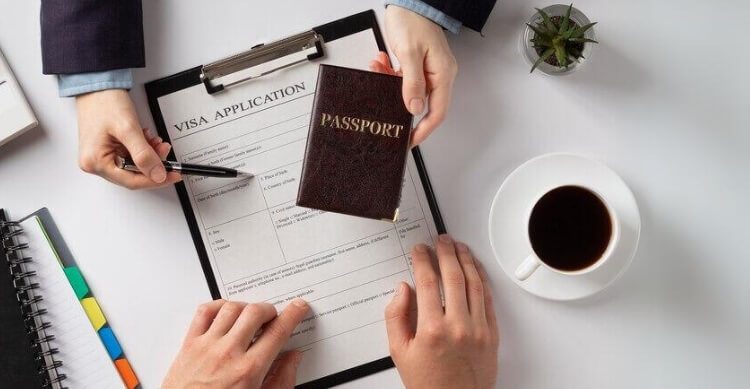Conferences are valuable opportunities for professional growth and networking, providing a platform to exchange ideas and stay updated in various fields. However, attending conferences in different countries raises questions about visa requirements. A common query arises: “Can you use a work visa to attend a conference?”
Using a work visa to attend a conference may not be the most suitable option in most cases. Applying for a visitor visa or a specific conference visa is generally recommended for conference attendance.
Understanding the intricacies of visa regulations is crucial for individuals seeking to participate in international conferences. This article will explore the possibilities and limitations of using a work visa for conference attendance.
Do You Need a Visa to Attend a Conference?
When it comes to attending conferences in Canada, the need for a visa depends on your citizenship and the duration of your stay.
- Canadian Citizens: Canadian citizens do not require a visa to attend conferences in their own country.
- US Citizens: US citizens generally do not need a visa to attend conferences in Canada. However, they must present a valid passport at the border and need to obtain an Electronic Travel Authorization (eTA) if traveling by air.
- Other Foreign Nationals: Most foreign nationals will need a visitor visa or an Electronic Travel Authorization (eTA) to attend a conference in Canada, regardless of duration. The specific visa requirements depend on your country of citizenship.
You should check the official website of Immigration, Refugees and Citizenship Canada (IRCC) or consult an immigration professional to determine the exact visa requirements based on your nationality and conference details. Ensuring you have the necessary visa will help you avoid any issues when attending a conference in Canada.
Understanding Conference Visas
When it comes to attending conferences, there are several types of visas that individuals may consider. The most common ones include work visas, conference visas, and B2 visas.
Work Visas
Work visas are typically intended for individuals employed in a specific country. While they may allow temporary work activities, their primary purpose is not conference attendance. Using a work visa for conference purposes is limited or even prohibited, depending on the country’s regulations.
Conference Visas
Some countries offer specific visas designed for conference participants. These visas are tailored to individuals attending conferences, seminars, or similar events. They often have provisions allowing a limited stay to accommodate the conference duration. Conference visas streamline the process for conference attendees, ensuring compliance with immigration requirements.
B2 Visas For Attending Conferences
In the United States, the B2 visa category is commonly used for attending conferences. B2 visas are non-immigrant visas allowing temporary tourism, business, or medical treatment visits. Attending conferences falls under the business category. However, note that B2 visas have specific limitations, such as restrictions on engaging in gainful employment or remuneration during the visit.
Can You Use a Work Visa to Attend a Conference?
When attending conferences in Canada, using a work visa for conference purposes is not the most appropriate option. Work visas in Canada are primarily intended for individuals employed for an extended period. While some work visas allow for limited temporary activities, attending conferences does not fall within the scope of these visas.

To attend a conference in Canada, individuals generally need to apply for a visitor visa or an electronic Travel Authorization (eTA) if they are from a visa-exempt country. These visas are for temporary visits, including tourism, business meetings, and conferences.
Note that each individual’s circumstances vary, and it’s advisable to consult the official website of Immigration, Refugees and Citizenship Canada (IRCC) or seek advice from an immigration lawyer for accurate and up-to-date information on visa requirements for attending conferences in Canada.
By understanding the appropriate visa category for conference attendance, individuals can ensure they comply with Canadian immigration regulations and have a hassle-free experience when participating in conferences in the country.
How To Obtain a Conference Visa?
There are several key steps to obtaining a conference visa and ensuring successful international conference participation. Here’s how you can obtain the conference visa:
Understanding The Application Process
To obtain a conference visa for Canada, you must familiarize yourself with the application process.
- Gathering Required Documents: Collect the necessary documents like a Notarized Invitation Letter, including a valid passport, completed application form, proof of conference registration or invitation, proof of financial support, and any additional documents requested by the Canadian embassy or consulate.
- Filling Out The Application Form: Complete the visa application form accurately and provide all the required information. Ensure that you answer each question truthfully and include all relevant details.
Securing A Conference Visa Invitation Letter
Securing a conference visa invitation letter is essential in obtaining a conference visa for Canada.
- Purpose And Importance Of A Conference Visa Invitation Letter: The invitation letter serves as evidence of your purpose for travel and validates your participation in the conference. It demonstrates that you have been officially invited to attend the event.
- Steps To Obtain A Letter Of Invitation: Contact the conference organizers and request a formal invitation letter. Provide them with the necessary information, such as your full name, passport details, and the purpose of your visit. The organizers will issue the invitation letter, which you can include in your visa application.
Time Required for Obtaining a Conference Visa
When planning to attend a conference abroad, it’s crucial to consider the time required to obtain a conference visa. Understanding the timeline is essential for effective planning and a smooth visa application process.
Factors Influencing The Processing Time
The processing time for obtaining a conference visa for Canada can vary depending on several factors.
- Volume Of Applications: The number of visa applications processed at a given time affects the overall processing time. During peak seasons, such as the summer, processing times are longer due to increased application volumes.
- Completeness Of Application: Submitting a complete and accurate application with all required documents expedites the processing time. Incomplete or incorrect applications lead to delays or even rejection.
Estimated Duration For Obtaining A Conference Visa
The estimated duration for obtaining a conference visa for Canada ranges from a few weeks to several months.
- Standard Processing Time: The standard processing time for a conference visa in Canada is typically within a few weeks. However, this is only an estimate and varies based on individual circumstances and the workload at the visa office.
Tips For Planning Ahead And Managing Timelines
To ensure a smooth visa application process and manage timelines effectively, consider the following tips:
- Apply Early: Start the visa application process well before the conference dates to allow sufficient time for processing and potential delays.
- Review Requirements: Familiarize yourself with the visa requirements and gather all necessary documents before submitting your application. This will help avoid any last-minute complications.
- Follow-up: Keep track of your visa application status and any updates from the visa office. Contact the appropriate authorities if your application takes longer than the estimated processing time.
Conclusion
So, can you use a work visa to attend a conference? The answer varies depending on the country’s regulations. However, using a work visa is generally not the most suitable option when attending conferences. It is crucial to understand the different visa types available for conference attendance, such as visitor or specific conference visas.
When it comes to attending conferences in Canada, work visas are generally not intended for conference purposes. Instead, individuals should apply for visitor visas or Electronic Travel Authorizations (ETAs). By following the appropriate visa application process, including securing a conference visa invitation letter, attendees can navigate the process smoothly and ensure compliance with immigration laws.
Choosing the correct visa category is essential for a successful and legally compliant conference experience. By understanding the visa requirements and planning, attendees can fully immerse themselves in conferences, fostering professional growth and valuable networking opportunities.






